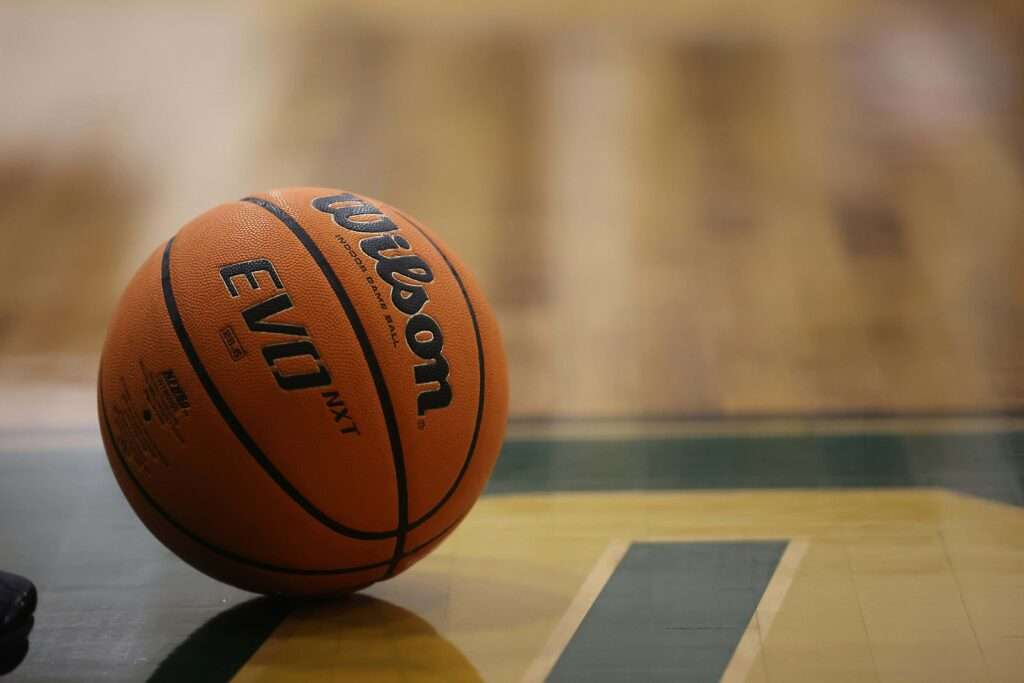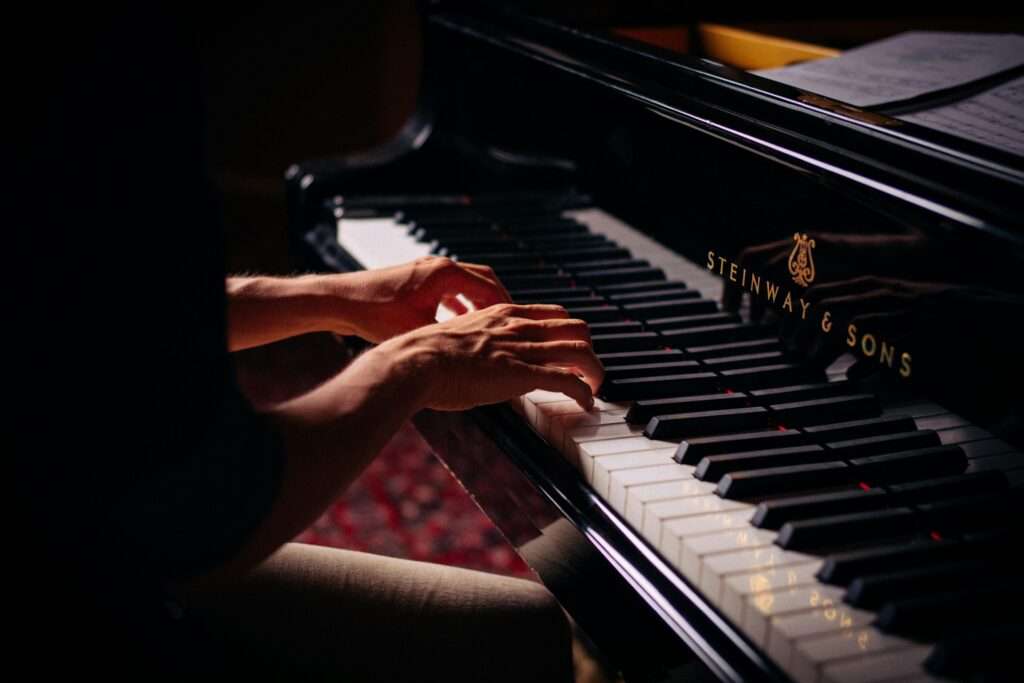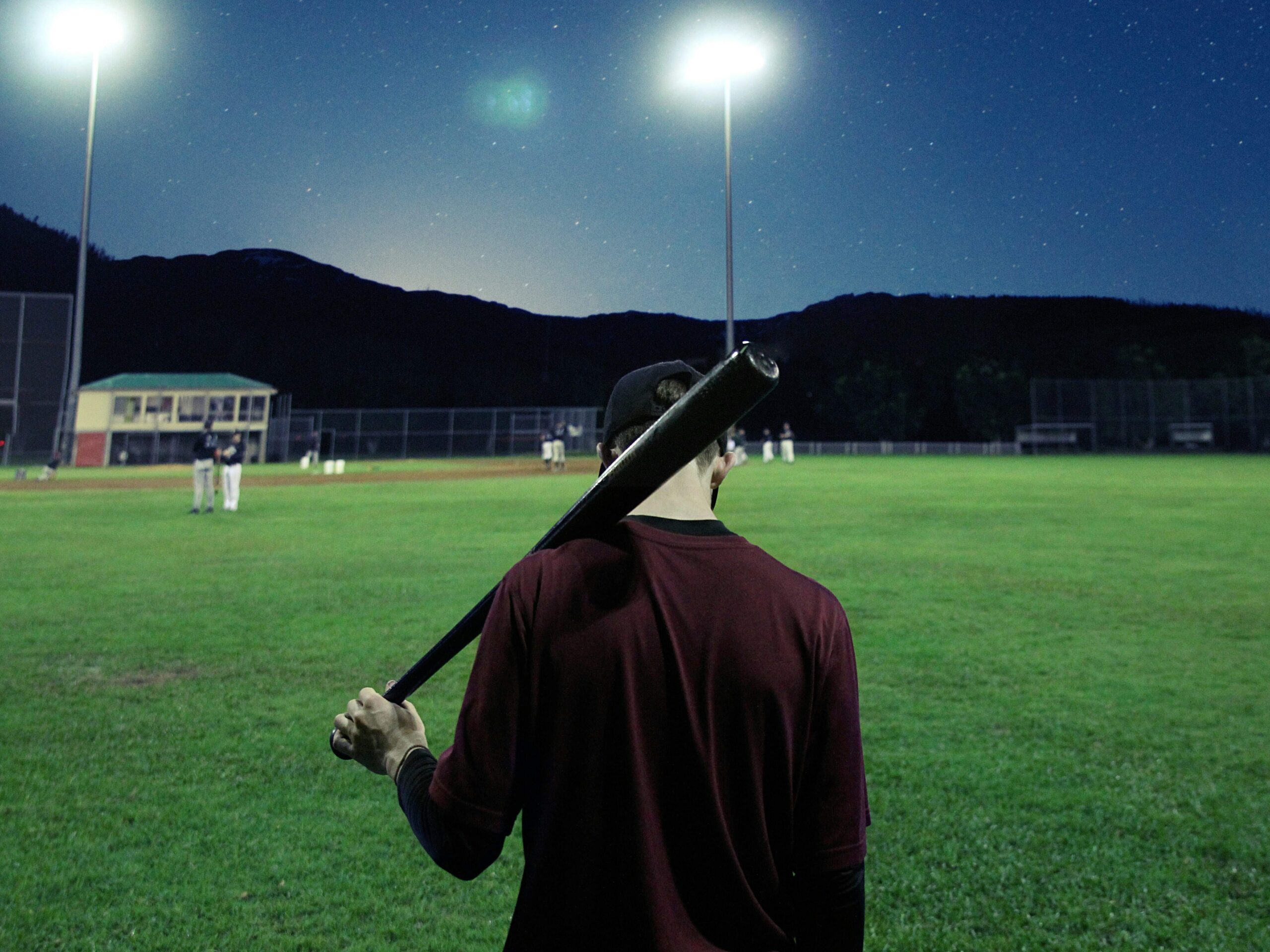I still remember the day when performance anxiety became a thing for me.
I’d been taking piano lessons since I was eight. Something about the piano clicked with me from the beginning. I ate up the lessons and devoured all the music my teacher could find. In fifth grade, I stunned the judges with my performance in the gifted and talented program, and in high school, I wowed my peers at the National Honor Society banquet with a Brahms rhapsody.
I loved music so much, I decided to make a career out of it.
Then came college, and with it my turn to perform in forum—a formal gathering of all the music majors at Viterbo. It was my freshman year, my first time performing—from memory—for people who were better than me. I crossed the stage, positioned myself on the piano bench…and immediately forgot what I was supposed to play.
That was the day performance anxiety sunk its hook in me.
I prayed at that moment, though it was more a silent scream of terror in my heart than coherent words inside my brain. Whatever it was, I threw my fingers at the keyboard, and God delivered. I played the entire piece entirely by muscle memory, my brain completely detached from my hands. Afterward, I took my bow, walked off stage, and collapsed in tears.
That was the day performance anxiety sunk its hook in me, and it’s been there ever since. Anyone who’s dealt with this knows performance anxiety is a cycle. Once you get on it, it’s doggone difficult to get off. I still managed to obtain a degree in music (including the required, fully-memorized senior recital), but my confidence never truly recovered.
I know what performance anxiety can do to a person. You could be the best musician, the best athlete, the best intellect, but nobody would ever know it because every time you step on stage—or on the court or the field or wherever—your nerves dictate your performance. It’s a tough one to shake.
But it can be beaten.
After years of struggling and letting fear push me away from progress, I started researching, gathering information, and testing it, determined to finally break the cycle of performance anxiety and be free. And though I’m not all the way there yet, I’d like to share with you what I found so you can start taming the beast too!

Hey, I’m Lauren, author of YA Christian fiction and
blogger for teens ready to level up in faith.
Subscribe for inspiring content and free YA ebooks!
In This Article
How to Break the Cycle of Performance Anxiety in 7 Steps
The key to overcoming performance anxiety lies not in trying to suppress your nerves but in working with them. Feelings and sensations offer valuable information. Fear can be a lifesaver if it runs you away from a dangerous situation.
But when you’re standing in front of a microphone or holding a basketball, your life is rarely in danger. The key to taming the beast is developing and maintaining a sense of control over your feelings and reactions, and these seven steps will help you do that.

1) Closer to a performance, prime your strengths.
The hours leading up to a performance are not the time for intense drilling and correction.
This is the first thing most of us get wrong. As a performance or game approaches, we tend to spend all our practice time frantically drilling the skills we’re weakest on. A certain passage of music that keeps tripping you up, a certain basketball shot you can never make…
Take note: The hours leading up to a performance are not the time for intense drilling and correction. That time is over (and will come again after you perform), but on the day of the big event, your warm-up time is best spent reminding yourself of what you’re capable of.
For musicians, that means warming up with the best parts of your piece rather than frantically trying to polish up a known rough spot. Athletes might choose to run through a few quick drills that emphasize their best skills. If you haven’t mastered a certain aspect yet, it won’t come when you’re under pressure. Instead, build confidence by reminding yourself yes, I actually do know how to do this and my strengths far outweigh my weaknesses.
2) Fight the baby monsters first.
Instead of trying to tackle your tension, anxiety, and fear—the giant monsters—start with the smallest item you have control over that’s related to the situation. Something as simple as:
- your breathing
- what time you show up for an event
- where to focus your eyes
- your warm-up ritual
Once you get a foothold on one thing, gradually climb the ladder to something bigger until you’ve hit the monster right on the head.

3) Give yourself a choice—to quit.
There’s a time for jumping in with both feet, and people who do are often lauded for their boldness. But it’s not always all or nothing. All or nothing often leaves you with nothing. Sometimes something is enough.
All or nothing often leaves you with nothing. Sometimes something is enough.
It’s okay to entertain the idea of slowing down or even giving up. You’re not a coward if you do. By actively considering quitting, you give yourself the choice to continue. It becomes your decision—not your coach’s, or your teacher’s, or your mom’s.
And if after considering quitting you find yourself still there, you know it’s because you want to do whatever it is you’re doing.
4) Come out in the open.
Think you’re the only one who’s afraid? That’s because everyone else is doing the exact same thing you’re doing—hiding their fear. The thought that you might be the only one barely holding it together multiplies your anxiety.
Be the one who breaks the cycle of performance anxiety by allowing yourself to do something you thought was negative: Let your anxiety out. Tell your audience. Share your fears with your teammates. Confess your worries to your coach/teacher/supervisor. The few who have never felt a single fear (and are clearly not human) will be far outnumbered by the ones who know exactly how you feel.
There is power in embracing the truth rather than fighting it.

5) Adopt a ritual.
I used to think rituals were stupid and superstitious. Indeed, there are some who believe their game performance is directly tied to following an exact pre-game routine.
Adopting a ritual shifts your focus to behaviors you are in charge of.
That’s not what I’m suggesting here.
Adopting a ritual shifts your focus to behaviors you are in charge of (see #1) and pushes items you have little control over to the back of the mind. Something as simple as running the same scales right before a piano recital, or practicing the same number of swings before going up to bat. A ritual is a coping mechanism for the brain. It convinces it you have more control than you do.
Just don’t fall for the lie that you’ll definitely fail if you don’t follow it to a tee. 🙂
6) See your emotions as messengers, not dictators.
You are not a nuts-and-bolts robot—a body pre-programmed for a specific outcome. Everything you do, including this performance, involves all of you, your emotions as well. Negative or unsettling emotions may come unexpectedly, but it’s up to you to decide what to do with them.
Learn from them. Don’t let them drive your actions. Instead of fighting a sensation, move it into your awareness. Feel it. Then interpret it correctly. Sweaty palms, increased heart rate, and jitters can either be nervousness or excitement. Acknowledging them and categorizing them quiets the brain’s alarm and turns on the brain’s controller, thus weakening a feeling’s connection to negative thoughts and actions.
Some feelings are meaningless or unimportant—false alarms triggered by your overactive inner self. Teach yourself to not react so strongly to these.

In his book Do Hard Things (a highly recommended read), performance expert Steve Magness suggests this exercise:
- Put yourself in an uncomfortable situation related to your fears.
- Direct your attention to what you’re feeling and sit with that sensation. Experience without judging.
- Describe what you’re feeling.
- Separate physical sensations from the feeling (i.e. sweaty palms from anxiety).
- Give it a name: “performance adrenaline.”
- Either reframe those feelings as information you can choose to listen to and learn from, or simply let them float on by.
7) Look at the situation through a wide-angle lens.
Real confidence is not saying everything will work out fine. It’s believing you’ll be fine even if it doesn’t. (See my post What is Genuine Confidence—And Where Can I Get Some?)
Most of the time, the worst that could happen really isn’t all that bad.
The bigger picture is Jesus loves you, he’s got your back, and your earthly performance will in no way affect your eternity. This moment will pass and be forgotten someday.
Heaven, however, is forever.
Performance anxiety grows when you zoom in on the situation as if it were the most important thing. Ask yourself, what’s the worst that could happen? Embarrassment? Losing the game? Earning a low score? Failure to make the cut? All these things, while unpleasant, pale when you zoom out and look at the bigger picture.
Most of the time, the worst that could happen really isn’t all that bad.
Related: 21 Bible Verses to Calm Anxiety from Ramsey Solutions
You Can Do It!
Remember, some nerves are good. A healthy dose of adrenaline keeps you alert and active so your performance doesn’t lag. But you don’t need to let your fear rule you or run you away from something you love. You can tame the beast, overcome performance anxiety, and live to tell about it!
More Resources for Teens Dealing With Performance Anxiety

You don’t have to have all the answers.
but, hey, why not?
Bring me your questions about faith, life, God, the Bible… and I’ll help you find the answers.
- Lacking Self-Confidence? You Don’t Need It!
- More Than “Get a Grip”: How to Work Through Performance Anxiety (from the mental health professionals at Christian Family Solutions)
Thank you for sharing such practical tips with biblical wisdom undergirding them! I wish I’d read this before performing my solo this past Christmas.
Yes, I too wish I’d known these things earlier in my career. But I also learned a lot through the performances that didn’t go so well. Hopefully you found something here that will help you for your NEXT solo 🙂
Comments are closed.